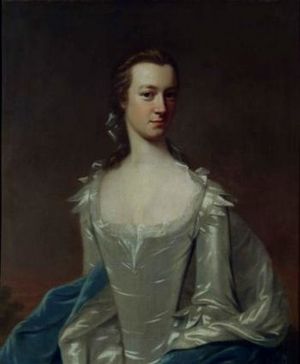Margaret Wake Tryon facts for kids
Quick facts for kids
Margaret Wake Tryon
|
|
|---|---|
 |
|
| Born |
Margaret Wake
c. 1732 London, England
|
| Died | 16 February 1819 |
| Nationality | English |
| Spouse(s) | |
| Children | 2 |
| Parent(s) |
|
Margaret Wake Tryon (born around 1732 – died 1819) was an English woman who inherited a lot of money. She was married to William Tryon. He was a very important person in America's early history.
William Tryon served as the Colonial Governor of North Carolina. Later, he became the Colonial Governor of New York. Margaret Wake Tryon is famous because Wake County in North Carolina is named after her. She is one of only three women to have a county named after them in North Carolina. Margaret was also known for being interested in military plans. This was quite unusual for women from wealthy families during her time.
Contents
Margaret Wake Tryon's Life Story
Early Life and Family Background
Margaret Wake was born in London, England. Her family was well-known and respected. Her father, William Wake, worked for the East India Company. He was the Governor of Bombay from 1742 to 1750. Bombay is now called Mumbai, in India.
Margaret's mother, Elizabeth Elwin Wake, came from an important family in Norfolk, England. Before she got married, Margaret lived with her family in a house in Hanover Square, Westminster.
Marriage and Moving to America
On December 26, 1757, Margaret married William Tryon. He was a captain in the army, part of the Grenadier Guards. Their wedding took place at St. George's Church. Margaret was an heiress, meaning she inherited a lot of money. She brought about £30,000 with her when she married. This was a huge amount of money back then!
Margaret and William lived in a house on Upper Grosvenor Street in London. They had two children together. Their daughter was named Margaret, but their son sadly died when he was a baby. A year after they married, William was promoted to Lieutenant Colonel in the army.
In 1764, Margaret moved with her husband to the Province of North Carolina. William was starting his new job as Lieutenant Governor there. They lived in a house called Russelborough House. It was located on the Cape Fear River in Wilmington. During this time, they traveled around the colony. They were special guests at a fancy party in New Bern.
Governor's Wife and Tryon Palace
In 1765, King George III appointed Margaret's husband as the Governor of North Carolina. This was a very important position.
In 1770, Margaret and William moved into Tryon Palace in New Bern. They had helped build this grand house. It was designed to be the official home for the Governor of North Carolina. They left New Bern in 1771. This was because William was appointed the Colonial Governor of New York.
How Wake County Got Its Name
In 1770, a colonial planter and assemblyman named Joel Lane decided to name a new county. He named Wake County in honor of Margaret Wake Tryon. This shows how important she was in the colony.
An Unusual Lady
People described Margaret Wake Tryon as "accomplished" and "learned." She was very talented at playing the organ and the spinet, which is like a small harpsichord.
Margaret was known for something quite unusual for women of her time. She often avoided spending time with other women. Instead, she preferred to talk with men. She especially enjoyed conversations about government and how to build military forts. This was considered very unconventional back then. She was also very interested in military plans and religion. She had a large library at Tryon Palace, filled with many books. It was also said that Margaret insisted on being called Your Excellency. This was the same formal title used for her husband, the Governor.
Later Years and Legacy
Margaret returned to England with her family during the American Revolution. This was a time of big changes in America. When her husband died in 1788, he left most of his property to her and her children.
Margaret Wake Tryon passed away on February 16, 1819, in Yarmouth, Isle of Wight. She left some of her property to friends and family in her will.
Images for kids
 | Bayard Rustin |
 | Jeannette Carter |
 | Jeremiah A. Brown |


